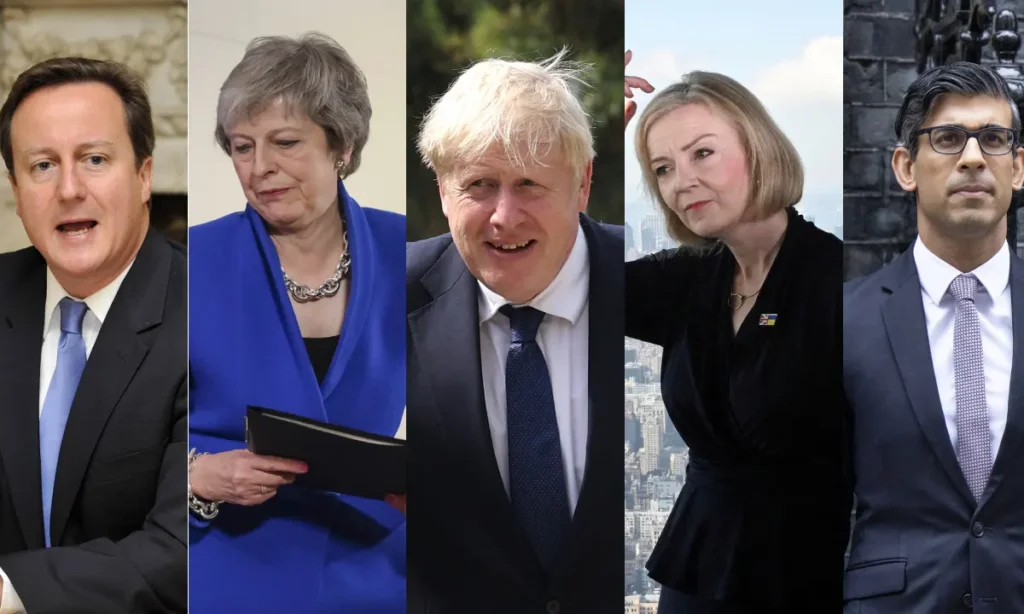It’s over. 14 years of hurt. The UK has elected a Labour government. In a landslide victory, Labour crushed Rishi Sunak’s Conservative government, winning 412 of the 650 seats in the UK’s Westminster parliament. Labour won across the UK. In England, Labour took back the working-class heartlands it lost to Boris Johnson’s Conservatives in 2019. Labour revived its support in Scotland, taking 36 of the Scottish National Party’s 46 Westminster seats, severely weakening Scotland’s independence movement. In Wales, Labour won 27 out of the 32 seats.

But…there is always a but… although comprehensive and wide, Labour’s victory is shallow. People did not vote for Labour, they voted against the dismal record office Conservative prime ministers over 14 years.
The first, David Cameron, began a cruel, ideological austerity. Cameron, and his successors, intentionally starved public services of funds to cut taxes, pushing people into poverty, delaying hospital treatment for millions and allowing school buildings to collapse. Cameron was also reckless, calling the Brexit (the UK’s leaving the European Union) referendum in 2016, not in the interest of the UK, but to placate the right-wing of his Conservative party.
Prime minister Theresa May, was unable to deliver the false promises of Brexit, bringing Boris Johnson to power. Johnson’s incompetence first produced a Brexit deal that made the UK poorer and then mishandled the Covid-19 pandemic, but it was his self-centred lying and indifference over parties during the pandemic lockdowns that brought him down. Liz Truss, prime minster for 49 days, crashed the UK economy adding hundreds of pounds a month to mortgage payments and causing the Bank of England to step in to rescue pension funds. Finally came Rishi Sunak’s chilling indifference to the cost-of-living crisis. A very rich man, oblivious to the problems of poverty, he chose to believe the growth and inflation figures on his Excel spreadsheet, rather than accept the struggles of ordinary people’s reality. The Conservatives won only 121 seats, their lowest in the Westminster parliament since the modern party was formed in 1832. Former prime minster Liz Truss lost her seat.
The surprise is not that the Conservatives were punished but that it took 14 years. Things had looked very different back in December 2019 when, following a big election victory under Boris Johnson, the Conservatives were expected to be in power for a decade, perhaps longer. That victory was based on Johnson’s promise to deliver Brexit, which many people were persuaded to believe would solve the UK’s problems. The UK left the EU in January 2020, but Brexit continues to haunt and divide the UK.
Brexit continues to divide
Most believe Brexit to be a failure. The disagreement lies over why it has brought no benefits. For those who voted remain, the reason is obvious. There are no benefits because Brexit was a fantasy built on lies. Many who voted for Brexit, however, believe that there are no benefits because the Conservative government did not implement Brexit properly. They argue that the UK has wasted its ‘independence’ by not deregulating the economy or cutting immigration, which is higher now than when the UK was in the EU.
In 2024, the ‘Brexiters’ deserted the Conservative party and voted for Reform UK, the new version of the Brexit party led by the veteran anti-Europe, anti-immigration campaigner, Nigel Farage.The size of the Reform UK party vote was a major reason why Labour’s victory was so big. With a 14.3% share of the vote, Reform UK was third, behind Labour (33.8%) and the Conservatives (23.7%). However, despite receiving more than 4.1 million votes, Reform UK won only five parliamentary seats. In contrast, the Liberal Democrats took 12.2% of the vote and won 72 seats.
This is due to the UK’s ‘first-past-the-post’ electoral system. The winner is whoever receives most votes in the constituency and the government is formed by whichever party wins most constituencies. The proportion of the vote is irrelevant. The Lib Dems benefitted from ‘tactical’ voting, particularly in rural constituencies. Everyone there who opposed the Conservatives voted for the Lib Dems. Labour also benefitted, wining back many seats in its traditional industrial heartlands, because Reform UK took Brexit supporter’s votes from the Conservatives.

Consequently, although a parliamentary majority of 174 gives the Labour government the power to do whatever it wants, there will be no moves to reverse Brexit soon. Even though a new deal with the EU would be the easiest way to secure the economic growth on which the Labour government’s success depends, Prime Minister Keir Starmer will not wish to alienate the 4.1 million ‘Brexiters’ who voted for Reform UK.
Nigel Farage will also be in parliament. He has loyal supporters and a talent for expressing their grievances. Farage’s Reform UK party will continue to frame the UK’s problems as ones caused by immigration and a failure to implement Brexit properly. The reality is different. The UK is an advanced, complex, multiracial, multicultural country. It has many strengths and weaknesses and, like many other countries, faces the challenge of building a more equitable and sustainable economy and society in a troubled world.

Less than five years ago, the Conservative party was looking at a decade in power. Now it is humbled by a crushing electoral defeat because it lost its coalition of supporters, including those who support Brexit. Now that the Labour party faces the prospect of a decade in power, Keir Starmer will not want to repeat the Conservative party’s mistake.


